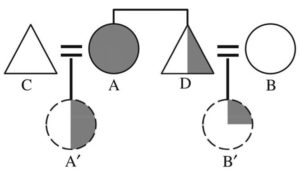Dyble M, Gardner A, Vinicius L & Migliano AB (2018) Inclusive fitness for in-laws. Biology Letters 14, 20180515. Cooperation among kin is common across the natural world and can be explained in terms of inclusive fitness theory, which holds that individuals can derive indirect fitness benefits from aiding genetically related individuals. However, human kinship includes not only genetic kin but also kin by marriage: our affines (in-laws) and spouses. Can cooperation between these genetically unrelated kin be reconciled with inclusive fitness theory? Here, we argue that although affinal kin and spouses do not necessarily share genetic ancestry, they may have shared genetic interests in future reproduction and, as such, can derive indirect fitness benefits though cooperating. We use standard inclusive fitness theory to derive a coefficient of shared reproductive interest (s) that predicts altruistic investment both in genetic kin and in spouses and affines. Specifically, a behaviour that reduces the fitness of the actor by c and increases the fitness of the recipient by b will be favoured by natural selection when sb > c. We suggest that the coefficient of shared reproductive interest may provide a valuable tool for understanding not only the evolution of human kinship but also cooperation and conflict across the natural world more generally.
Cooperation among kin is common across the natural world and can be explained in terms of inclusive fitness theory, which holds that individuals can derive indirect fitness benefits from aiding genetically related individuals. However, human kinship includes not only genetic kin but also kin by marriage: our affines (in-laws) and spouses. Can cooperation between these genetically unrelated kin be reconciled with inclusive fitness theory? Here, we argue that although affinal kin and spouses do not necessarily share genetic ancestry, they may have shared genetic interests in future reproduction and, as such, can derive indirect fitness benefits though cooperating. We use standard inclusive fitness theory to derive a coefficient of shared reproductive interest (s) that predicts altruistic investment both in genetic kin and in spouses and affines. Specifically, a behaviour that reduces the fitness of the actor by c and increases the fitness of the recipient by b will be favoured by natural selection when sb > c. We suggest that the coefficient of shared reproductive interest may provide a valuable tool for understanding not only the evolution of human kinship but also cooperation and conflict across the natural world more generally.